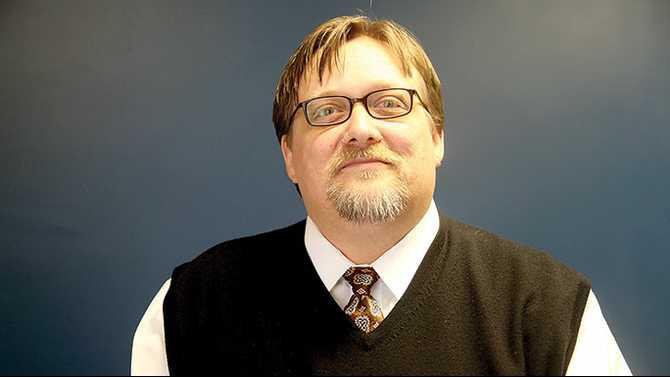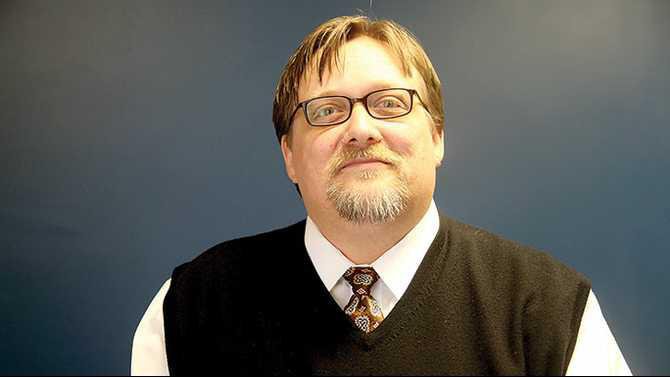Andrew Peabody started his position as Rockdale Emergency Relief’s new Executive Director on Monday but has hit the ground running, even while he’s finishing a Doctorate of Ministry at Duke University’s Divinity School on weekends. Service runs in his blood; his father is a pastor, his mother a teacher, and his brother, Joe Peabody, Jr., recently became head pastor at Salem United Methodist. Peabody, who grew up in small towns across north Georgia, is a minister in the North Georgia UMC conference and previously served in leadership with the nonprofit MUST Ministries. We caught up with Peabody in his first week, while the paint was still drying in his new office.
How did you become involved in nonprofit work?
When I was a teenager, I did some volunteering at a group run by MUST Ministries, it was called SNOR (Safe Night of Rest)... I just got turned on at a young age to the idea of actually helping other people. I was at a time in my life when I was trying to figure out what course my life was going to take. I began to see that as a possibility. Of course then I ran away and went to school. I was going to become a history professor. A lot of history professors had a lot of impact on the civil rights movement. They documented that, they made it powerful and meaningful. I thought for a while I was going to be a history professor in that vein but I honestly just had the sense that that wasn’t going to be the calling on who I was as a person. I had the opportunity to come back and come to seminary at Emory.
At the end of seminary, I had, frankly, a crisis of conscience. I have been talking for years about these values I espouse. From my faith perspective, I felt it was time to put these values into practice. I felt it was time to get into the trenches as much as possible.
The decision to go into VISTA was the decision to earn exactly what poverty level wages were in the community I was serving. I think I was making $432 a month.
It was invigorating. While I knew I couldn’t continue to live at that level forever, every night, when I went to bed, I knew I had been a part of making a difference for somebody, that I had been a part of change. That is something I have carried with me in working with nonprofits.
Staff members at places like RER, when they get discouraged, I like to be able to look at them and say, just remember when you go to bed tonight, what you’ve been a part of in helping somebody else’s life be better. We all need something that carries us forward.
I also got very excited about volunteerism specifically. Volunteerism is an unbelievable thing – that people would choose to give of themselves.
When I think about nonprofits, social enterprises like ours, we give people with skills and talents opportunities to do something they want to do. They want to give to other people... In terms of our base of volunteers, I want to see it grow... As they come to us, I think they are transformed in the process too. We talk about it in church circles as formation. The schools have picked up on that with character formation. I want to see our volunteer program grow so we can be a better return on the investment.
How did you come to your understanding of what people need?
There are two different types of needs people have. There’s the immediate need to ameliorate suffering. This person is hungry, this person is homeless. There’s another set of needs - how do we help this person recover from whatever cycle they’re in, whether that’s a generational poverty, whether that’s addiction.
I decided early on being willing to engage with people at their point of suffering gives them trust. They’ll be willing to work with you in terms of longer term transformational-type of activity. In having worked with people who are experiencing homelessness, for example, if they come to you for help and you say the only way we’re going to help you is if you change your life completely, that is not likely to be effective. On the other hand, if you prove to them you’re willing to meet them at their point of need… I think people are willing to work with you on those greater transformations that mean changes in life habits, education opportunities. RER does some of both of those kinds of things.
We’re not just looking for the output, such as the cans of food given away, but we’re also looking for the outcome. The change in someone’s life.
One of the things that attracted me to RER is that it does have this long history in the community and the opportunity to connect with people that can say these are some of the things that are part of our history.
One of the things I’m studying at Duke is the power of tradition innovation. There’s so many people who want to say things are either/or – either you’re a part of the tradition or you are a force for change and innovation. When really perhaps, for institutions, some of the best growth occurs when what you’re doing is building upon the strengths of the tradition you already have.
I’m hoping one of the things we can do is know our history, know what we’re able to do, and recognize that we may be facing new challenges because of new economic times, changing social circumstances, but want to grow out of the tradition that already exists because that’s a narrative that people in the community have come to know and embrace. I hope that will be good. Organizations like ours can’t just exist by doing the innovation that keeps doing the same thing that’s always done. We have to look towards, in education circles, they call it disruptive change. We have to now look at the new needs...
The other thing I was looking for was the opportunity to serve in a community that had a some serious growing edges. Rockdale has had a lot of transformation over the past 25 years. I was looking for a place where there was an opportunity to serve. It goes back to putting yourself in a meaningful place.
I’m up for a challenge because none of us do this alone... It didn’t take me but a few minutes to see that I wasn’t in here as a Lone Ranger - I was here as part of a team. That’s the only way people can keep doing this in nonprofits. This is a good team, a strong team.




